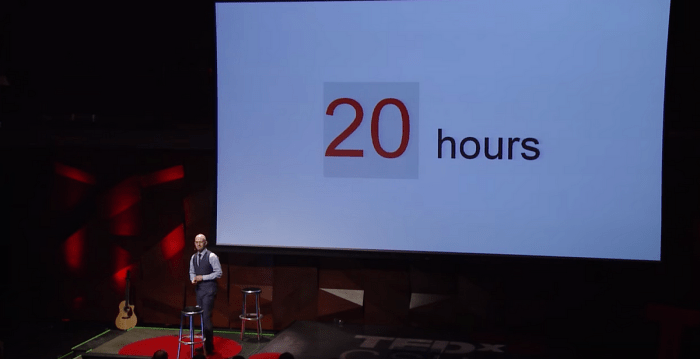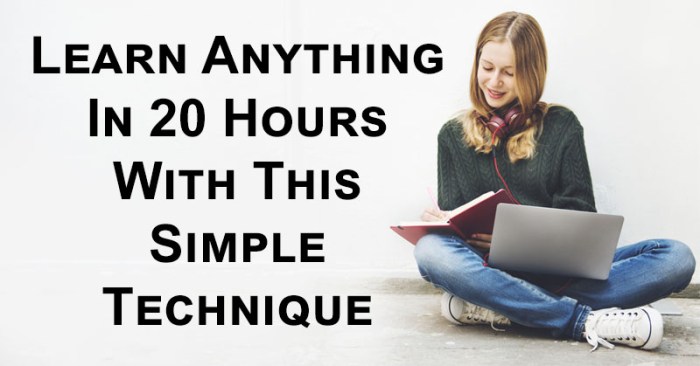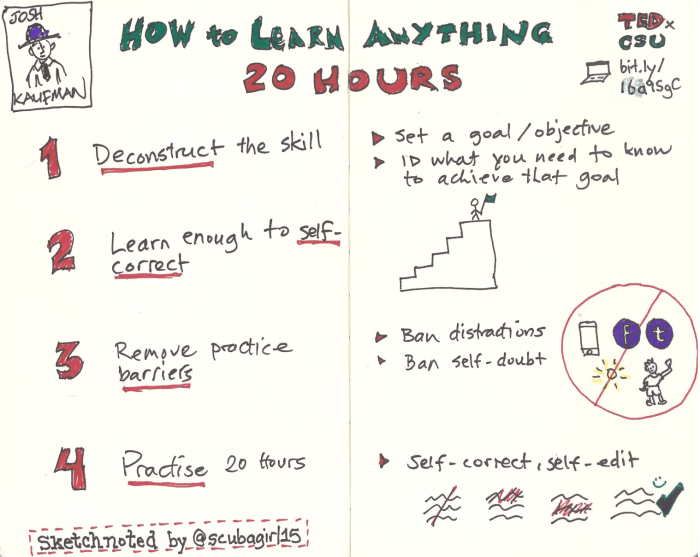How to Learn Anything in 20 Hours dives into the art of rapid skill acquisition, offering insights on effective research, strategic planning, deliberate practice, and resource utilization. This guide empowers learners to maximize their learning potential within a short timeframe.
Breaking down complex skills, embracing deliberate practice, and leveraging resources efficiently are key components explored in this comprehensive approach to accelerated learning.
Research and Planning

Before delving into learning something new, it is crucial to conduct thorough research to gain a solid understanding of the topic. Research helps in identifying the key concepts, resources, and best practices that will aid in the learning process.
The Importance of Research
- Research helps in setting realistic expectations about the learning process.
- It allows you to identify the most effective learning resources and methods.
- Research provides a comprehensive overview of the topic, enabling better retention of information.
Effective Planning Strategies
Effective planning is essential to make the most out of the limited time available for learning. Here are some strategies to help you plan efficiently:
- Break down the learning process into smaller, manageable tasks.
- Allocate specific time slots for learning each day to maintain consistency.
- Eliminate distractions and create a conducive learning environment.
Setting Clear Goals
Setting clear and specific goals is key to streamlining the learning process and staying focused. Goals help in defining what you want to achieve and provide a roadmap to guide your learning journey. Here are a few tips for setting effective learning goals:
- Ensure your goals are specific, measurable, achievable, relevant, and time-bound (SMART).
- Break down larger goals into smaller milestones to track progress easily.
- Regularly review and adjust your goals based on your progress and feedback.
Breaking Down the Skill

Breaking down a skill into manageable parts is crucial for effective learning and mastery. By deconstructing the skill into smaller components, learners can focus on mastering each part individually, leading to a deeper understanding and better retention of the overall skill.
Identifying Core Components
To identify the core components of a skill, start by researching and analyzing the skill to understand its structure. Break it down into smaller tasks or steps that make up the skill as a whole. Look for patterns, recurring themes, or foundational elements that are essential to the skill.
- Make a list of the key actions or techniques involved in performing the skill.
- Identify any prerequisite knowledge or skills needed to master the skill.
- Focus on the most important and commonly used aspects of the skill.
Enhancing Understanding and Retention
Breaking down the skill not only helps in mastering individual components but also aids in connecting these components to form a cohesive understanding of the skill as a whole. By focusing on each part separately, learners can build a strong foundation before moving on to more complex aspects of the skill.
By breaking down a skill, learners can approach learning systematically, making it easier to track progress and stay motivated throughout the learning process.
Deliberate Practice

Deliberate practice is a focused and structured approach to learning that involves breaking down a skill into specific components and systematically working on improving each one. This method emphasizes intense concentration, repetition, and feedback to maximize learning efficiency.
By engaging in deliberate practice, individuals can accelerate their skill acquisition process significantly. Here are some examples of how deliberate practice can lead to rapid learning:
Example 1: Music
- Practicing scales and chords for a set amount of time each day
- Receiving feedback from a music teacher on technique and performance
- Setting specific goals for improvement, such as mastering a difficult piece within a short timeframe
Example 2: Language Learning
- Regularly practicing speaking, listening, reading, and writing in the target language
- Utilizing language learning apps or resources to reinforce vocabulary and grammar concepts
- Engaging in conversation exchanges with native speakers to receive real-time feedback
When incorporating deliberate practice into the learning process, it is essential to follow these strategies for optimal results:
Strategies for Effective Deliberate Practice
- Set specific, measurable goals to track progress and maintain motivation
- Focus on mastering one skill at a time to avoid feeling overwhelmed
- Seek feedback from experts or mentors to identify areas for improvement
- Allocate dedicated time each day for deliberate practice to build consistency
- Challenge yourself with increasingly difficult tasks to continue pushing your boundaries
Utilizing Resources

When learning a new skill in a short amount of time, utilizing the right resources can make a significant difference in your progress. It’s essential to choose resources that are tailored to the specific skill you are trying to acquire and that align with your learning style.
Various Resources for Efficient Learning, How to Learn Anything in 20 Hours
There are several resources that can aid in learning a new skill efficiently:
- Online tutorials and courses: Platforms like Coursera, Udemy, and Khan Academy offer a wide range of courses on various subjects.
- Books and e-books: Reading comprehensive guides or textbooks can provide in-depth knowledge and insights into the skill you are trying to learn.
- Online forums and communities: Engaging with like-minded individuals can help you gain practical tips, insights, and support throughout your learning journey.
- Mentors and experts: Seeking guidance from experienced professionals in the field can provide valuable feedback and direction.
Choosing the Right Resources
It’s crucial to choose resources that are relevant to the skill you are learning. Consider the following factors when selecting resources:
- Quality and credibility: Ensure that the resources are reputable and credible sources of information.
- Alignment with learning goals: Choose resources that align with your specific learning objectives and goals.
- Accessibility: Opt for resources that are easy to access and understand within your limited time frame.
Leveraging Technology and Online Platforms
Technology can be a powerful tool for accelerating your learning process:
- Online courses and tutorials: Utilize platforms like YouTube, Skillshare, and LinkedIn Learning to access a wide range of video tutorials and courses.
- Mobile apps: Choose learning apps that offer interactive lessons, quizzes, and progress tracking features to enhance your learning experience on the go.
- Social media and online communities: Join groups or follow pages related to the skill you are learning to stay updated on trends, tips, and resources.
Conclusive Thoughts: How To Learn Anything In 20 Hours

In conclusion, mastering new skills in just 20 hours is an achievable feat with the right approach and dedication. By implementing the strategies highlighted in this guide, learners can embark on a transformative learning journey with confidence and efficiency.